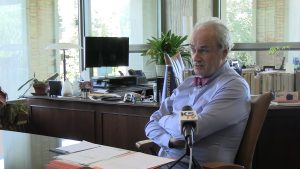Despite ancient fears, some Lebanese are optimistic for a positive, united future
April 22, 2005
Lebanon has been a country in pain since the early 1940s. Conflicts with Israel and the influx of Palestinian refugees from Israel in the late 1940s did much to provoke the cultural melting pot in Beirut and throughout the country.
Recent political events, such as the appointment of Najib Mikati, a U.S. educated millionaire and former minister of public works in Lebanon, to the position of prime minister-designate, have done much to make a politically volatile situation in Lebanon even worse.
While many who live within Lebanon’s borders, both occupied and unoccupied, feel the situation will only get worse, some Lebanese abroad feel a change is in the air.
Bilal Zoghbi, a 27-year-old doctoral student in physics, has not been back to his home in Lebanon for three years. However, he does keep in contact with his family and reads Lebanese news every day.
“I know for the past two months it’s been difficult for the Lebanese people,” Zoghbi said. “But I am optimistic for the future — I see people from all different points of view and different ethnicities coming together, and it gives me hope for a peaceful future.”
Zoghbi said while he may be optimistic, some of his family members and many other Lebanese are not.
“It’s hard for people to understand the need to put differences aside to build a country,” Zoghbi said. “The wall of fear and emotion has been broken after many years — people have the chance to say what they want now, and there are those who have hope for a new future and a prosperous economy.”
Zoghbi also noted that while the new prime minister, Mikati, may not be the best choice, he is much better than the other candidates.
“The situation depends on the coming election, which we’re hoping will be in the next month or so,” Zoghbi said.
The Lebanese political process for rule is one that was established nearly 70 years ago. The top three positions are reserved for members of specific religious groups: The president must be a Maronite Christian, the prime minister must be a Sunni Muslim and the speaker of the national assembly must be a Shiite Muslim.
These political agreements, first made in 1943 between Lebanon’s first president, a Maronite, and the first prime minister, a Sunni, were solidified into the Lebanese constitution following the Taif Agreement in 1990. A major part of the Taif Agreement was the Lebanese promise to never harbor aspirations of uniting with Syria. So how does this feature in the upcoming elections, considering Mikati’s moderate pro-Syrian leanings and U.S. involvement in peace-keeping between the countries?
“I wish (American intervention) had happened 15 years ago,” Zoghbi said. “There are some people back home who feel it is interfering, and it makes people afraid a little bit. But there are those of us who hope America will help sort out the situation.
“If people accepted this, people would be more open to balance and it would be good for the whole country, and therefore the whole country would be in a better situation. We need to put our effort now into building a country — hopefully, things will change.”
Contact general assignment reporter Shelley Blundell at [email protected].
















